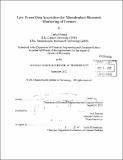Low power data acquisition for microImplant biometric monitoring of tremors
Author(s)
Khanna, Tania
DownloadFull printable version (11.76Mb)
Other Contributors
Massachusetts Institute of Technology. Department of Electrical Engineering and Computer Science.
Advisor
Joel Dawson.
Terms of use
Metadata
Show full item recordAbstract
In recent years, trends in the medical industry have created a growing demand for implantable medical devices. In particular, the need to provide doctors a means to continuously monitor biometrics over long time scales with increased precision is paramount to efficient healthcare. To make medical implants more attractive, there is a need to reduce their size and power consumption. Small medical implants would allow for less invasive procedures, greater comfort for patients, and increased patient compliance. Reductions in power consumption translate to longer battery life. The two primary limitations to the size of small medical implants are the batteries that provide energy to circuit and sensor components and the antennas that enable wireless communication to terminals outside of the body. The theory is applied in the context of the long term monitoring of Parkinson's tremors. This work investigates how to reduce the amount of data needing to acquire a signal by applying compressive sampling thereby alleviating the demand on the energy source. A low energy SAR ADC is designed using adiabatic charging to further reduce energy usage. This application is ideal for adiabatic techniques because of the low frequency of operation and the ease with which we can reclaim energy from discharging the capacitors. Keywords: SAR ADC, adiabatic, compressive sampling, biometric, implants
Description
Thesis (Ph. D.)--Massachusetts Institute of Technology, Dept. of Electrical Engineering and Computer Science, 2012. Cataloged from PDF version of thesis. Includes bibliographical references (p. 97-100).
Date issued
2012Department
Massachusetts Institute of Technology. Department of Electrical Engineering and Computer SciencePublisher
Massachusetts Institute of Technology
Keywords
Electrical Engineering and Computer Science.